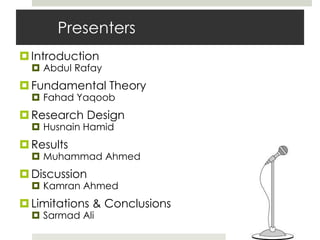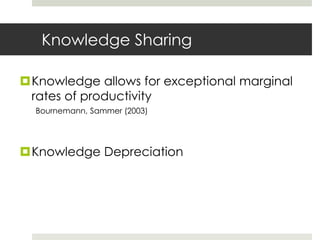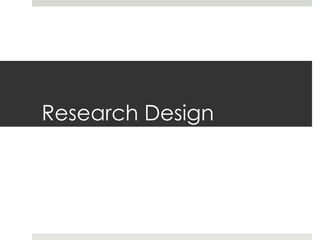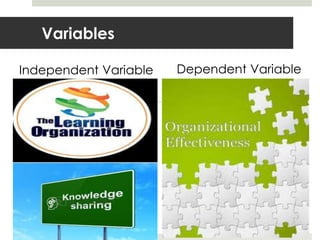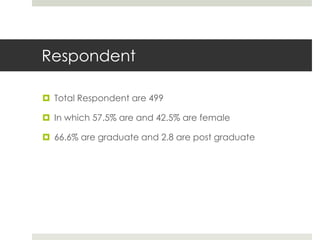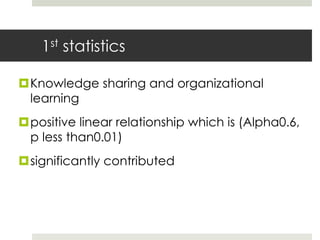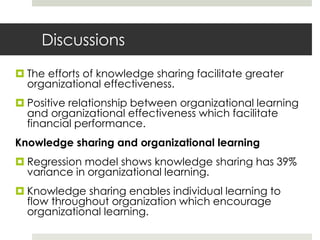Knowledge Sharing
- 1. The impact of knowledge sharing on organizational learning and effectiveness By: Jen-te Yang
- 2. Presenters Introduction Abdul Rafay Fundamental Theory Fahad Yaqoob Research Design Husnain Hamid Results Muhammad Ahmed Discussion Kamran Ahmed Limitations & Conclusions Sarmad Ali
- 3. Introduction What impact knowledge sharing & organizational learning creates on organizational effectiveness. Knowledge sharing Knowing process
- 4. Fundamental Theory Knowledge Sharing Knowledge sharing occurs when an individual is willing to assist as well as to learn from others in the development of new competencies Organizational Learning Organizations should be able to learn continuously, to leverage from the knowledge they capture, to apply it to reality and to increase innovative knowledge
- 5. Knowledge Sharing Knowledge allows for exceptional marginal rates of productivity Bournemann, Sammer (2003) Knowledge Depreciation
- 6. Knowledge Sharing 5 Types of Knowledge Depreciation First; employees quit a job without the transfer of their knowledge; Second; existing organizational knowledge is obsolete Third; new creative products and services are rendered sub- standard by old know-how or unprofitable products Fourth; knowledge is incompletely transferred Fifth; organizational knowledge is difficult to access KD has negative impact on organizational performance
- 7. Organizational learning Long-term success After Sharing knowledge – Interpretation of Info Reinforcement of individual absorptive abilities
- 9. Variables Independent Variable Dependent Variable
- 10. Research Hypothesis H1. Knowledge sharing positively influences organizational learning. H2. Knowledge sharing and organizational learning positively influence organizational effectiveness
- 11. Research Design 1200 questionnaires were distributed to participants across nine international tourist hotels in Taiwan. The response rate after deducting the unusable questionnaires was 41.6 percent. The questionnaires was based on literature review and the existing instruments. The questionnaire was initially written in English. The final set of the questionnaire was presented in both Mandarin and English It contained three sections: knowledge sharing, organizational outcomes, and demographics
- 14. Demographics
- 15. Respondent Total Respondent are 499 In which 57.5% are and 42.5% are female 66.6% are graduate and 2.8 are post graduate
- 18. Scale used Seven point scale 1 strongly disagree, 2 disagree, 3 slightly disagree, 4 moderate, 5 slightly agree, 6 agree, 7 extremely agree;
- 19. 1st statistics Knowledge sharing and organizational learning positive linear relationship which is (Alpha0.6, p less than0.01) significantly contributed
- 20. 2nd statistics Knowledge sharing, organizational learning and organizational effectiveness T scale used 80 percent output
- 21. What it mean? Learn from doing Don’t do practical you won’t learn Everyone shares his knowledge
- 22. Discussions The efforts of knowledge sharing facilitate greater organizational effectiveness. Positive relationship between organizational learning and organizational effectiveness which facilitate financial performance. Knowledge sharing and organizational learning Regression model shows knowledge sharing has 39% variance in organizational learning. Knowledge sharing enables individual learning to flow throughout organization which encourage organizational learning.
- 23. Discussions The integration of shared knowledge into organizational assets is necessary for organizational learning. Knowledge sharing had a statistically significant relationship with organizational learning. Knowledge sharing, organizational learning and effectiveness Contribution of organizational learning is relatively higher than contribution of knowledge sharing.
- 24. Discussions Knowing process is composed of 3 components Sharing Thinking Learning Sharing process enables individuals to think about sharer’s ideas Implementing knowledge sharing practices could facilitate creating new knowledge It improve organizational behaviors, make organization innovative and competitive which eventually leads to organizational effectiveness.
- 25. Limitations Limited focus of the sample Results may not be generalized
- 26. Conclusion The results support the Hypothesis H1: Knowledge sharing positively influences organizational learning. Successful implementation of explicit and implicit knowledge Ultimate goal of KS is to transfer knowledge to organizational capabilities (i.e. Assets)
Editor's Notes
- To Learn – Given by Peter Senge 1998
- Organizational forgetting (aka Depreciation)
- 5 types; Argote
- Focused on international chain hotels in Taiwan. Could not generalize international chain hotels in other countries and independent hotels in Taiwan because they may or may not have similar work patterns, organizational cultures or systems.
- To sum up the whole study Which means that knowledge sharing definitely impacts organizational learning at certain levels. Explicit & Implicit knowledge (codified & experiential learning), such as routine tasks and competencies required to do a job. But if there are no mechanisms implemented in an organization to store and share knowledge the effects won’t be long lasting, which means that organization may lose a great asset. The more the individual intellectual capital is transferred to organizational assets, the greater the degree of strength of organizational capabilities, (i.e. its effectiveness) will become.

